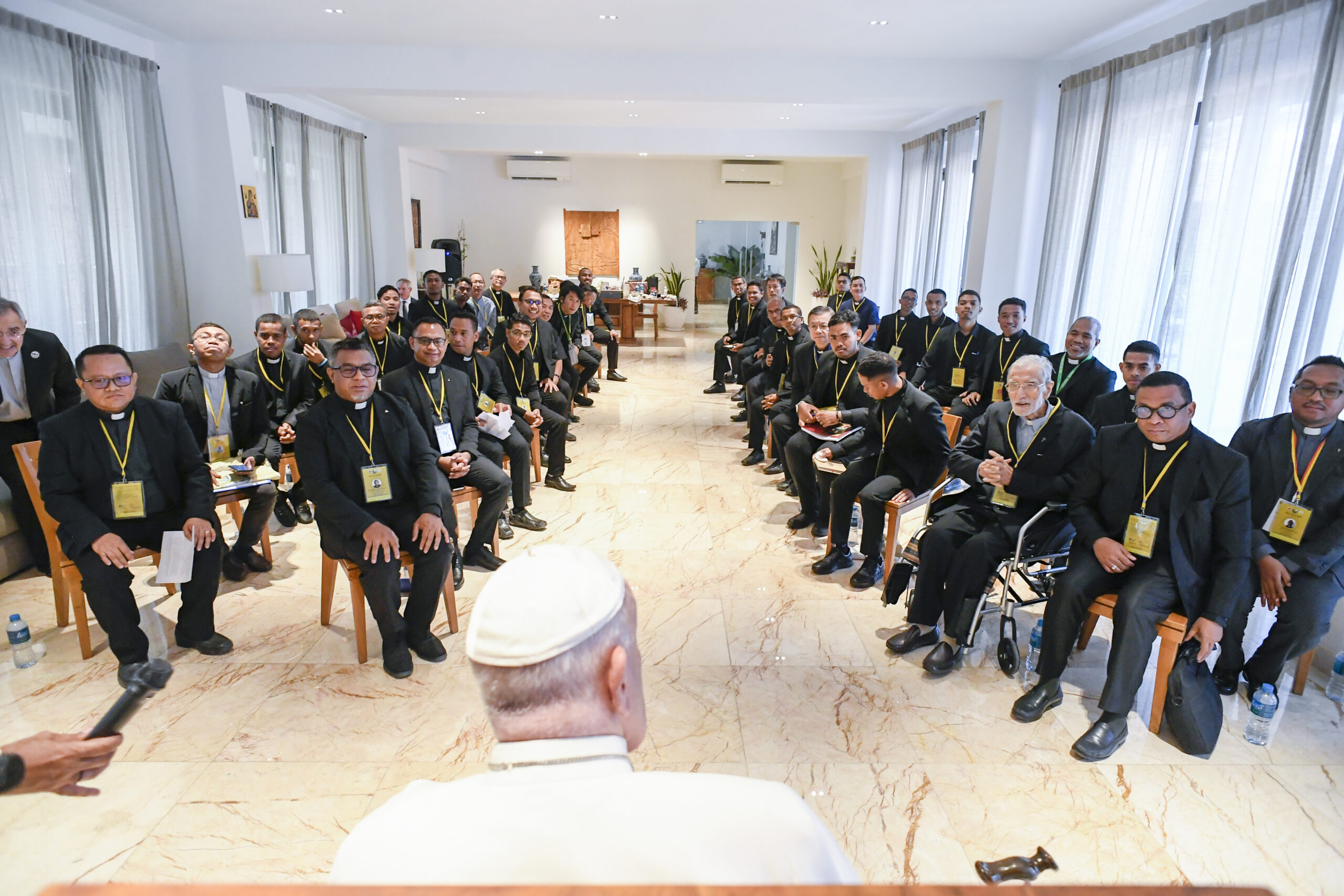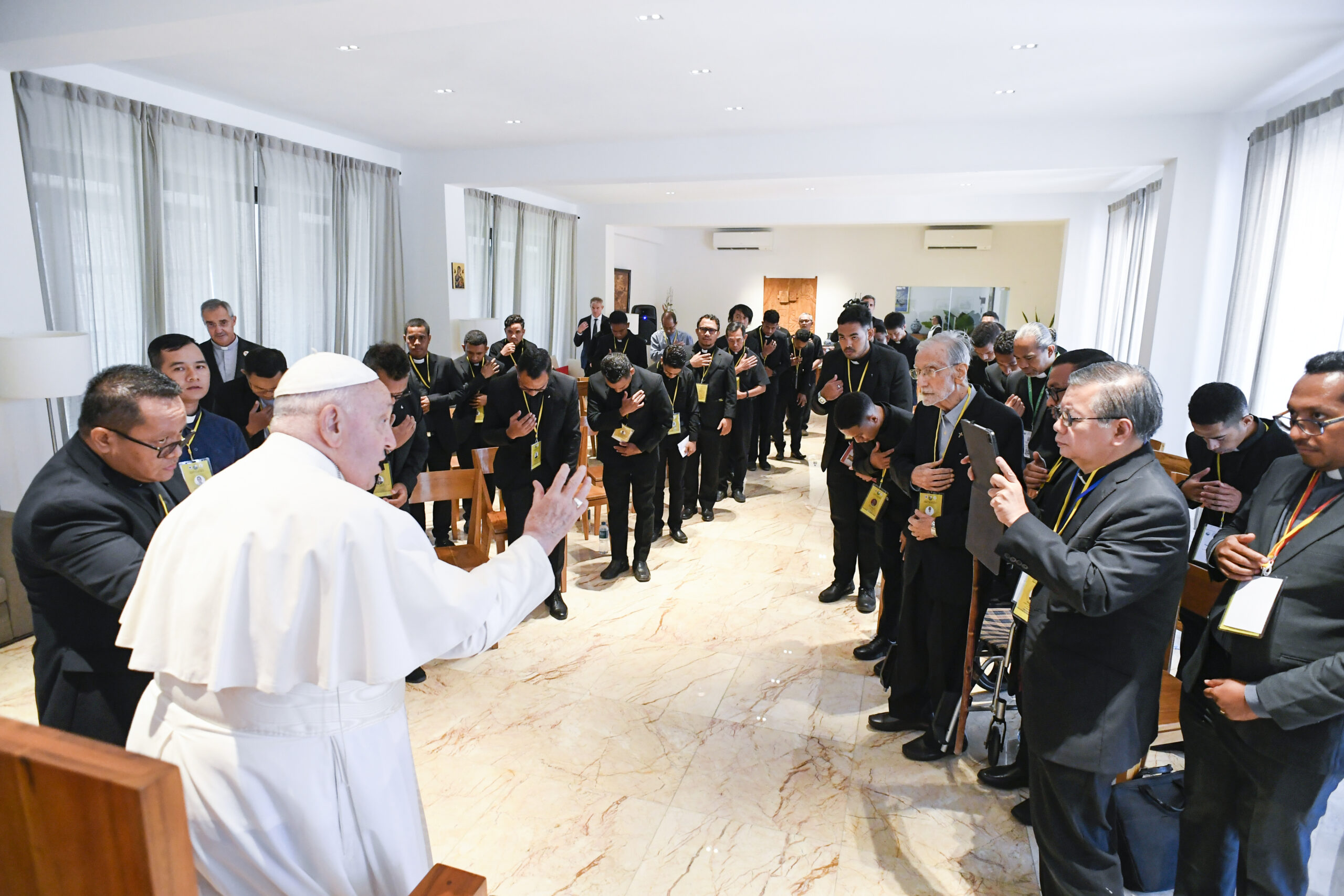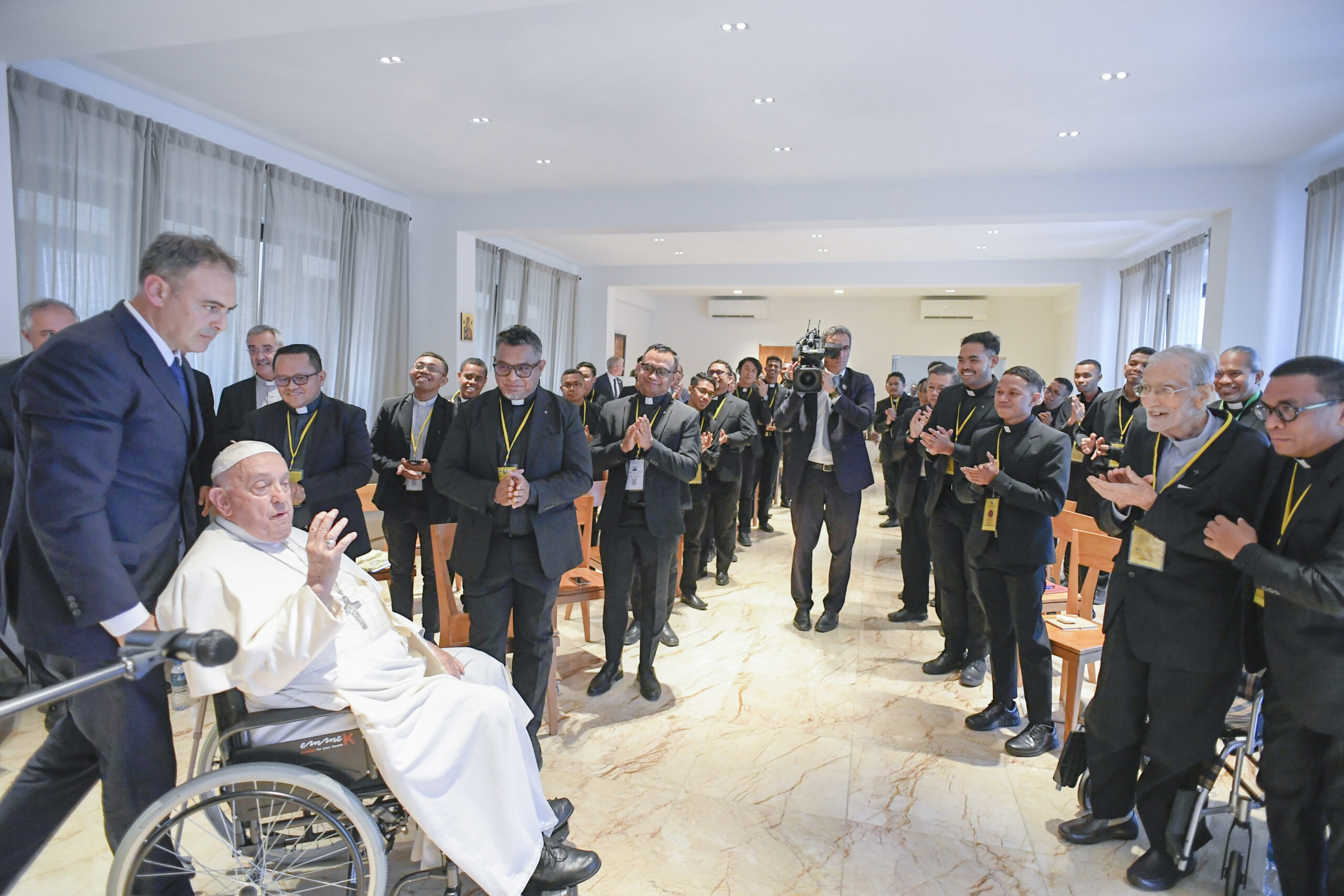10 September 2024
Nunciature, Dili, Timor-Leste
Transcript of the Meeting by Fr. Antonio Spadaro, SJ
After meeting with bishops, priests and consecrated persons in Dili Cathedral, Pope Francis met with 42 Jesuits from the country at around 11 a.m. on September 10. After the greetings, the regional superior, Erik John Gerilla, addressed a brief greeting to the pontiff and introduced the group, arranged in the shape of a horseshoe: “On behalf of all present allow me to express heartfelt thanks to His Holiness, for graciously receiving us today, the members of the Independent Jesuit Region of Timor. With us there are scholastics who are doing their formation, and not with us here is a priest now in Rome. We are engaged in the education ministry, spiritual ministry, social ministry, pastoral and formation work. I would particularly like to introduce Father João Felgueiras, the longest serving missionary from Portugal, who is now 103 years old. He personally knew the first Jesuit missionaries and connects ancient history with the present. This year marks a historic date for us Jesuits in Timor as we celebrate the 125th anniversary of the first Jesuit mission. Although we were expelled from Timor in 1910, we returned many years later. The chair in which you now sit, Your Holiness, was made from the timbers of the old ceiling of the old church, built by the Jesuits in 1904.”
You are industrious! Ask me questions now…
(The dialogue continued in Spanish and Portuguese.)

Good morning, dear Holy Father. First of all, thank you very much for being here with us. With joy, I would like to pose a question to Your Holiness: What does the holy father really hope with the motto of the holy father’s visit to Timor-Leste, “so that your faith becomes your culture”, for Catholics and the Catholic church in Timor-Leste, a country where the majority is Catholics in this Asian continent? How do we exactly make our faith meet our culture in this truly challenging era, in the context of church life in Timor-Leste?
One thing must be clear in the preaching of the Gospel: evangelize the culture, but also inculturate the Gospel. Faith must be inculturated. A faith that does not create culture is a proselytizing faith. We must not forget what Benedict XVI said: the Gospel is not spread by proselytizing, but by inculturating. Evangelization of culture and inculturation of faith must go hand in hand, and we must be attentive to this. Always remember the style of our mission in China!
Holy Father, in light of the global challenges facing the Church, what are the key areas that Jesuits in East Timor should prioritize in their apostolic mission?
The challenge of the Church is always not to move away from the people of God. We need to get away from ecclesial ideologies. This is the challenge I leave you with: do not turn away from the people who are the most precious asset.
I was ordained a priest three years ago and I thank God for the call to be a Jesuit. I would like to express my sincere thanks for this valuable and privileged opportunity. I have a question about the relationship between the Church and the Society of Jesus: what do you think is the relationship of the Society with the universal Church?
It is a relationship at war, always! [the pope said this with a laugh]. I entered the novitiate in 1958, so I lived through all the conciliar changes. I participated in the election of Father Kolvenbach, where there was already a group of Spanish Jesuits who were accusing the Society of betraying the Church. At that moment of crisis in the Society of Jesus, it was very important to have a charismatic Father General. And there I saw the tensions in the Church unfold. The speech that St. Paul VI gave at General Congregation XXXII is a work of art. It clearly says what the Church wants from the Society. I ask you to read that speech: it is a masterpiece. When I had become pope, I asked if there were manuscripts of the speech; so, the librarian went to the Secret Archives and brought them to me. He wrote it in his own hand; that’s why I say it’s spontaneous. I saw the draft written in his own hand. Read it, it is a strong speech. This outlines the relationship with the Church, a relationship of freedom.
Afterwards, there were moments that were interpreted as clashes, such as when St. John Paul II went to visit Father Arrupe, who was already ill. Father Dezza was appointed to temporarily lead the Society at that time. Some pointed to him as a conservative who would have a negative impact. But instead, he was great. He helped us understand how to govern the Society in the storm. You here have had to pilot several storms. Learn from this tradition in the difficult times of the Society!
East Timor is a very Catholic country. There is a risk of clericalism. What do you think about that?
You put your finger on the sore spot: clericalism, which is everywhere. For example, there is a strong clerical culture in the Vatican, which we are slowly trying to change. Clericalism is one of the most subtle means the devil uses. Father de Lubac, in the last pages of his book Meditations on the Church, talks about “spiritual worldliness.” He says it is the worst thing that can happen to the Church, even worse than the time of popes with concubines. Clericalism is the highest form of worldliness within the clergy. A clerical culture is a worldly culture. That’s why St. Ignatius insists so much on examining worldliness, the spirit of the world, because our sins, especially for frontier men, will be there, in these spheres; in intellectual worldliness, in political worldliness…
I am very much helped by the example of Peter Faber, whom I love very much. By the way, they “listed” him as “blessed,” one of the greatest men the Society has ever had. Elected Pope, I made him a saint. A great man. Faber was a non-clerical priest, going from place to place in the service of God. In my opinion, for you, for us priests, this spiritual worldliness is the most difficult disease to overcome.
I put together a book of occasional themes I wrote about when I was archbishop. Among other things, there is a letter I wrote about clericalism and worldliness. St. Ignatius makes us ask for the grace not to have the spirit of the world. If you have time, read it; it is in a small book called: Santos no mundanos.[3] Clericalism is the worst disease. So, you say, “There is clericalism here,” so we have to be responsible and teach young priests another way to live their ministry. Clericalism is a culture that destroys the Church. Therefore, it is necessary to fight against it. The way to fight it is to be pastors of the people. But you can tell me, “I work in the university, among the intellectuals.” Well, those intellectuals you have there at the university are people. Be shepherds of your people! One last thing to avoid clericalism. I borrow St. Paul’s words to Timothy, “Remember your mother and grandmother.” When you become conceited, think of your mother and grandmother! The faith they gave you was not clericalism; it was something else…

Holy Father, in your 11 years as the first Jesuit pope, what have been the most important decisions and the most difficult challenges for the universal Catholic Church?
What you might call the program for my papacy is in Evangelic Gaudium. You can find it there. I want to remind you of something about preaching. For me it is very important to find preachers who are close to the people and to God. I like priests who preach for 8 minutes and say everything. And then mercy: always forgive! If someone asks for forgiveness, you forgive. I confess that in 53 years of priesthood I have never refused an absolution. Even if it was incomplete. I heard a cardinal say that when he is in the confessional and people start telling him the most serious sins while stammering out of shame, he always says, “Go ahead, go ahead, I understand already,” even if he hasn’t understood anything. God understands everything. Please, let’s not turn the confessional into a psychiatric consulting room; let’s not turn it into a court. If there is a question to be asked, and I hope there are few, it is asked and then absolution is given. A confessor in Buenos Aires, a Capuchin whom I made a cardinal and who is 96 years old, hears confessions all day long. He came to see me once and said, “I have a scruple, because I always forgive, I forgive everything.” “And what do you do when you have this scruple?”, I asked him. “I go to the Lord and tell him, ‘Get yourself together! Because you set a bad example for me!’”
What guidance would you offer us in addressing issues of social and environmental justice, particularly in the context of Timor-Leste’s continued development?
Social justice must take into account the three human languages: the language of the mind, the language of the heart, and the language of the hands. Being an intellectual abstracted from reality is no use in working for social justice; the heart without intellect, no use either; and a language of hands without heart and intellect, no use either.
The way Father Arrupe spoke to Latin American Jesuits about the danger of ideology mixed with social justice is important. Father Arrupe sent us a very rich pastoral letter on social justice. And Saint John Paul II also sent us another one.
This is characteristic of the Jesuits. For example, when they approached indigenous communities, they started with work, culture and music. They also helped those black slaves who escaped from slavery in “Reductions” called quilombos. In other words, the Jesuits also helped those who were considered social delinquents by the narrow mindset of the time for having fled slavery. The history of the Society is full of examples of social justice. None of these great men were “communists.” No, they were Jesuits, and they took up the social dimension of the Gospel.
On the day of judgment, none of us will be asked, “How did you behave? Did you go to Mass every Sunday? Have you attended meetings? Have you been obedient to the provincial?” I am not telling you to be disobedient, of course, but the Lord will not ask us this. Instead, he will ask us, “I was hungry, did you give me food? I was thirsty, did you give me something to drink? I was in prison; did you visit me? I was a fugitive; did you help me?” That is what we will be judged on. And this is what the Lord says. So social justice is an essential and integral part of the gospel.
It is very gratifying to see how this desire for social justice throughout history has borne fruit, depending on the times, people and places, as St. Ignatius says. When St. Ignatius asks us to be creative, he tells us: look at places, times and people. Rules and the Constitutions are important, but always consider places, times and people. It is a challenge for creativity and social justice. This is how social justice should be established, not with social theories. The gospel has its own voice.
How can we involve the laity in our mission, following its call to a more inclusive and participatory Church?
For its mission of inculturation, the Society needs the laity, and I like what the Society is doing with them in various places. A few months ago, the president of a Jesuit university came to see me. The university has a staff of lay professors, obviously men and women. I asked her, “And what do the Jesuits do?” She replied, “What they have to do: accompany pastorally and set out criteria for us.” The Jesuit, when he knows that a role can be taken up by lay people, leaves it to them. I insist a lot on the importance of leaving space for the laity, maybe because I am used to doing that. When I was provincial, we had three Catholic universities, two of them heavily in debt. With one of them, the Universidad del Salvador in Buenos Aires, we started a process of handing it over to the laity, who have been running it now for 25 years and everything is going very well, indeed better than before. The Jesuits help with pastoral work. The other university in Salta, which was run by the Wisconsin Jesuits, was taken over by the archbishop, and it has been doing very well. Only one remains, where almost all the top positions are held by lay people, and the Jesuits do the pastoral work. It is a university founded by the Society of Jesus. I had to make these three changes: give one to the laity, another to the archbishop, and keep the third one to be able to manage it well. This is my experience. Don’t forget that the important thing is pastoral care, both the intellectual pastoral care, which is fundamental, and the pastoral care related to being close to young people. For example, I have relations studying at a university in Washington, that is to say, Georgetown. The Jesuits have organized a good system and the students have a good spiritual, intellectual and community formation. To the question, “Is the university today a social apostolate?” my answer is, “Of course!” To prepare the next university leaders, of course.

Thank you for being pastor of the Church with a style that knows how to show the power of the Gospel of Jesus in confronting materialism and secularization. How have you developed your governing program? We Jesuits would like your advice in facing the challenges of our vocation. What do you advise us to do?
I was elected pope, without imagining that I could be. But once I was elected, I thought about the program I should follow. What the cardinals had said in the meetings before the Conclave was what I felt I had to enhance and make it a program. Because when one only does something with one’s own resources, it is not fruitful, it is not useful. Each of us has to carry out what we have been entrusted with, but with the originality of places, times and people. Of course, I come from Latin America and, for example, a German might not understand me right away, because he and I have different cultures. The criterion is always: take on the mission because it has been given to you. When you are elected pope, you are asked whether you accept the role or not. But once you have accepted, you have no choice: either you go ahead with your abstract, personal criteria, or you go ahead with what the Church asks of you. That’s how I developed my program.
The story of Clement XIV comes to mind. I am very sorry for his life. Through the maneuvers of the Spanish monarchy, he was elected pope. He was a good man, but naive. He had a secretary named Bontempi, who was a villain. With the complicity of the Spanish ambassador, he managed to get the Society of Jesus dissolved. Ganganelli was a weak pope in government, manipulated by a cunning scoundrel as secretary. A Jesuit must be strong in what he does, strong even in obedience, and he must not allow himself to be managed by anyone. He listens to advice, yes, but in the end he decides wisely. When Pope Clement XIV died, Bontempi, who was a Conventual friar, hid in the Spanish embassy. When the storm passed, he presented himself to his Superior General with three papal bulls: one that allowed him to handle money, another that allowed him to live outside the convent, and a third that, if I remember correctly, allowed him to travel anywhere. His superior, who was a man of God, said to him, “You’re missing the fourth one!” “Which one?” Bontempi asked, noting, “There are only three!” “The one that assures the salvation of your soul,” came the answer. I recommend you read Pastor’s account of the suppression of the Society (Ludwig von Pastor, 1854-1928, was a German historian. His best-known work is the History of the Popes from the End of the Medieval Age, which came out in 16 volumes.) He tells it very well in his History of the Popes. Every Jesuit should know the narratives where the Society was threatened with destruction. (cf. J.M. Bergoglio, Lettere della tribolazione, Milan, Ancora, 2019, 12).
